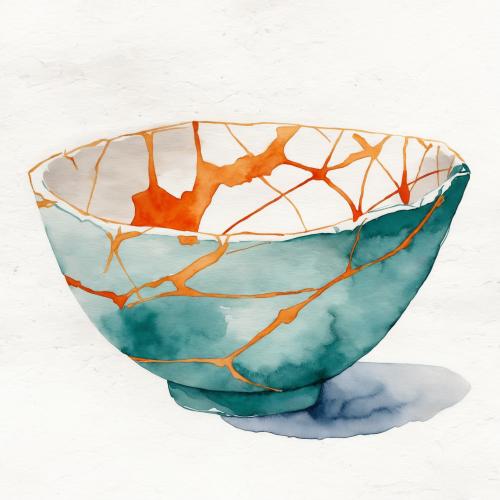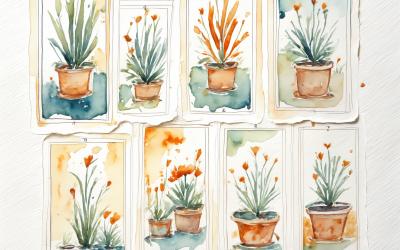In a world that pushes us toward perfection, it's refreshing to see how tarot and ancient wisdom remind us to accept our flaws. This article explores the unexpected perks of welcoming imperfection on our journey of personal growth and creativity. Find out why being 'perfectly imperfect' might just be the secret to tapping into your true potential and living a more genuine life.
Perfection is overrated. There, I said it. As a tarot reader, I've lost track of the times the cards have nudged me to share this nugget. In a world full of filtered photos and carefully designed social media feeds, accepting our imperfections can feel about as awkward as bringing a typewriter to a tech convention. But the truth is, it's those little quirks and imperfections that often spark the most meaningful growth and the most amazing, authentic creative expressions. So, let's have a good look into why it's the cracks in our armour that let the light shine through.
The Perfection Trap: Why Pursuing Perfection is a Losing Game
Perfection is like chasing a mirage in the desert: the closer you think you're getting, the more elusive it becomes. You can see this manifesting in every aspect of life, whether in spirituality or art, each offering its own take on why accepting our flaws isn't just okay, it's absolutely necessary.
The Japanese art of kintsugi is a stunning reflection of how we can welcome imperfections. In this fascinating practice, artisans repair broken pottery using gold, silver, or platinum, turning what was once damaged into a unique masterpiece. Rather than hiding the flaws, kintsugi celebrates them, highlighting the cracks as the focal point of the piece. Those golden seams add character, telling a tale of resilience and love for the object. So, a kintsugi pot isn't just valuable despite its flaws – it's valuable because of them, with every glimmering line enhancing its beauty and worth.
This celebration of imperfection isn't unique to Japan; it's wisdom that we see echoed throughout many countries and cultures around the world.
- In Navajo weaving, artisans purposefully add a 'spirit line' to their textiles. It's a little flaw that lets the weaver's spirit flow out of the work.
- Islamic art introduces a fascinating idea known as 'the Persian flaw', where artists intentionally sneak a little imperfection in their otherwise stunning and detailed designs. Why? Because they believe that only Allah can create something truly perfect, and striving for perfection ourselves would be an unforgiveable act of hubris.
These traditions go beyond charming cultural practices; they are powerful reminders that perfection isn't just out of reach—it's a beautiful and integral part of being human and connects us to something bigger than ourselves.
It's Better to Be Done Than Perfect
The thinking behind "It's Better to Be Done Than Perfect" (or you may hear it as "Perfection is the enemy of good") is simple: getting something finished, even if it's not flawless, is far more important than getting it perfect but never actually completing it. Life's too short to get stuck in the persuit of the elusive ideal of perfection. Sometimes, you just need to hit that submit button and move on. Life, after all, is a journey, and so it's about progress, not perfection. This little nugget of wisdom speaks volumes about our journeys, whether we're talking about our spiritual journey or exploring our creative sides.
When it comes to creativity, this saying really hits home: the journey of creating is way more important than chasing perfection. How many half-finished novels are gathering dust in drawers because their writers are holding out for the 'perfect' ending? And how many blank canvases stare back at artists who are too scared to make that first stroke, worried their work won't measure up?
When we think about spiritual growth, it's easy to get caught up thinking that everything has to be love, light and 'good vibes only'. In reality, the enlightenment comes from accepting the messy and imperfect journey that we're all on. It's about understanding that we don't just exit the womb knowing everything, but that we are continually learning, changing and evolving. Just as an artist learns more from finishing a less-than-perfect painting than from endlessly planning the ideal one, we grow more from living our imperfect lives rather than waiting until we feel ready or worthy.
This proverb really emphasises the importance of taking action instead of getting stuck in overthinking. Think of it like the vibe of the Knight of Wands in tarot—bold, fiery, and always ready to leap forward, even if the path isn't perfectly clear. It's all about having faith in the journey and realising that getting things done is often better than striving for perfection.
Tarot's Take: The Wisdom of Imperfection
In all my years of reading tarot, I've found that the cards are surprisingly pro-imperfection. Take the Eight of Pentacles: When it's upright, this card is all about nailing that mastery and honing your skills. But flip it over, and it nudges us to rethink what mastery actually looks like. Maybe being an expert isn't just about being perfect; it's really about getting to know our own limits and working with them, flaws and all. If you were to pair it with the Empress reversed, as I saw in a recent reading, it feels like the cards are giving our inner perfectionist a bit of a wake-up call. The Empress usually symbolises abundance and nurturing, but in her reversed state, she's urgently saying, "Hey, you need to take care of yourself, flaws and all, instead of always chasing after an idealised version of who you think you should to be."
Other cards also join in on this theme - The Tower pops up to remind us that sometimes, those perfectly built facades need to come crashing down for real growth and change to happen. It's like the universe saying it's way better to be authentically imperfect than to fake being flawless.
The Importance of Imperfection: Why It Matters
Accepting imperfection is about so much more than giving ourselves a break (though that's definitely a fantastic perk!). It's really about breaking free from the paralysis of perfectionism, which opens the door for us to create, grow, and connect in ways that feel genuine and real.
In art, it's those little imperfections give a piece its unique charm, creating a depth that's truly engaging. A hand-turned mug feels way more inviting than something cranked out by a factory. It's the same with voices; it's that personal touch in the tone that sets us apart. And in our lives, it's those little flaws that really draw people in, making us relatable and oh-so-human.
On a spiritual level, accepting our flaws is a journey towards humility and grace. It's a gentle reminder that we're all part of something much bigger than just ourselves, and we're always growing instead of chasing some unrealistic standard. It's about realising, as the saying goes, that a life lived fully, imperfections and all, is way more meaningful than one spent chasing after an unattainable perfection.
Embracing Your Perfectly Imperfect Self: A How-To Guide
So, how can we actually turn this wisdom into action? Here are a few fun ideas to get you started:
- Reframe Your Flaws: Next time you find yourself criticising something you think is a flaw, take a moment to breathe and think. Ask yourself: What if this trait is actually a hidden strength? How has it helped shape who you are today?
- Practice a little self-love: Talk to yourself the way you would to your best friend. Would you really scold them for not being perfect? Probably not. So why not show yourself the same grace and kindness?
- Accept Your Uniqueness: Just like beautiful kintsugi pottery, those "flaws" of yours are what make you special. They narrate your journey. Rather than trying to cover them up, why not celebrate them?
- Learn from Setbacks: When things don't go as planned, try not to label it as a failure. Instead, ask yourself, "What can I take away from this? How can this experience help me grow?"
- Enjoy the Ride: Life's not just about hitting some picture-perfect goal. It's all about the twists and turns, the ups and downs, and all those little moments that shape us. So, dive into the journey and accept those imperfections along the way!
- Take the plunge! Don't let the fear of not being perfect keep you from moving forward. Bear in mind that it's way better to finish something than to wait forever for it to be flawless. So, go ahead—dive into that project, spark that conversation, or take that leap, flaws and all!
In the end, maybe the most perfect thing we can do for ourselves is to embrace our imperfections. AAfter all, in the grand tapestry of life, it's often the irregular threads that create the most interesting patterns. So, the next time you find yourself beating yourself up over your flaws, remember: those little quirks might actually be your secret superpowers. Isn't that a perfectly imperfect thought?






